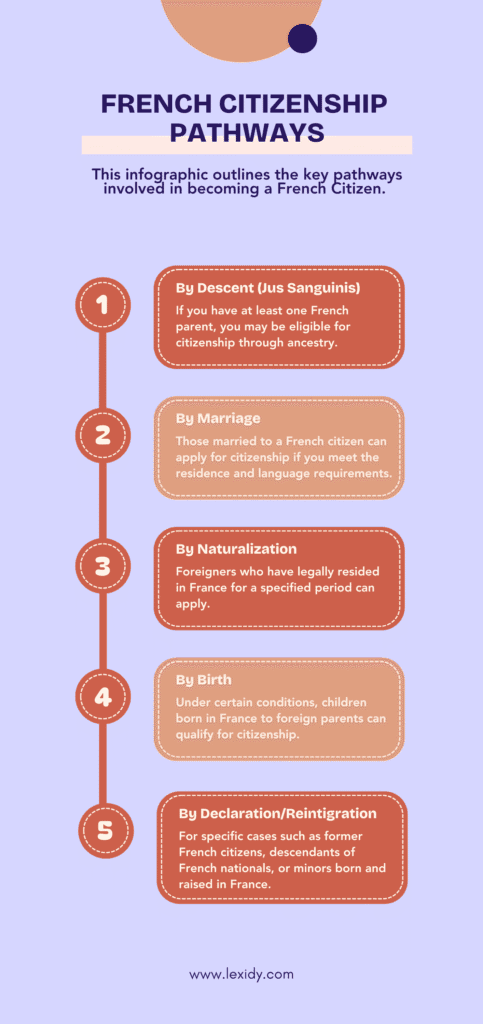Becoming a French citizen can transform the way you live, work, and travel. It means joining a community with a rich culture, global influence, and a high quality of life. Citizenship gives you the right to vote in French and EU elections, access public healthcare and benefits, and live or work freely across Europe. It also ensures the protection of the French state wherever you are in the world.
There are several ways to obtain French citizenship, including by birth under certain conditions, descent, marriage, naturalization, and reintegration. Each route has its own eligibility rules, documentation requirements, and application process.
Some applicants qualify through simplified procedures, while others face more detailed steps such as language tests, extensive paperwork, or administrative checks. This blog will guide you through each pathway, explain the requirements, and help you understand what to expect from application to approval.
(Article Updated August 2025)
Table of Contents
- Pathways to Becoming a French Citizen
- Citizenship by Descent (Jus Sanguinis)
- Citizenship by Marriage to a French National
- Citizenship by Naturalization
- Citizenship by Birth (Under Certain Conditions)
- Citizenship by Declaration or Rights
- General Requirements for French Nationality (May Vary by Pathway)
- How to Become a French Citizen: A Step-by-Step Process
- Required Documentation (Varies by Procedure)
- Getting French Citizenship: Challenges and Mistakes to Avoid
- Why Legal Support Matters When Becoming a French Citizen
- Frequently Asked Questions About Becoming a French Citizen
- Need Legal Assistance with Becoming a French Citizen?
Pathways to Becoming a French Citizen

France offers multiple legally defined routes to acquiring citizenship. Each route is based on different personal or familial circumstances. Whether you were born in France, have French ancestry, are married to a French citizen, or have lived in France for several years, there may be a pathway available to you, and the application process you must follow may vary based on your circumstances.
The main legal pathways to becoming a French citizen include:
- Citizenship by Descent (Jus Sanguinis): For those with at least one French parent.
- Citizenship by Marriage: For spouses of French nationals who meet residence and language requirements.
- Citizenship by Naturalization: For foreign nationals who have lawfully resided in France for a sufficient period.
- Citizenship by Birth (under certain conditions): For individuals born in France to foreign parents under qualifying residency criteria.
- Citizenship by Declaration or Reintegration: For specific cases such as former French citizens, descendants of French nationals, or minors born and raised in France.
Each pathway comes with its own eligibility rules, procedural steps, and required documentation, which we explore in the sections that follow.
Need help applying for French citizenship? Let our legal team guide you through each step.
Citizenship by Descent (Jus Sanguinis)
Under the principle of jus sanguinis (right of blood), any person with at least one French parent is eligible for French citizenship at birth, regardless of where they are born. This is one of the most direct and widely recognized pathways to becoming a French citizen.
Key Conditions:
- If the French parent was born in France, the child typically acquires French citizenship automatically at birth.
- If the child is born abroad and the French parent was also born abroad, the process is a little different. The applicant must submit:
- Proof of uninterrupted French citizenship in the family line.
- Formal proof of filiation, particularly when parentage is established after birth.
Important Notes:
- While this is considered a legal right, administrative procedures still apply to confirm and document citizenship status.
- In some cases, individuals only discover their eligibility later in life and may need to submit a nationality certificate request to formalize their status.
- Documented lineage, birth certificates, and proof of the French parents’ nationality are essential.
Even if citizenship is acquired by right, legal guidance may be needed to ensure proper recognition. This is especially the case in cross-border or late-registered cases.
Curious about qualifying through your family line? Read our full guide on French citizenship through ancestry to see if you could claim nationality based on your heritage.
Citizenship by Marriage to a French National
Foreign spouses of French citizens may become eligible to apply for French citizenship, but marriage does not automatically grant citizenship. Instead, it provides a legal pathway, subject to specific time, residency, and integration requirements.
Eligibility Criteria:
- You must be legally married to a French citizen at the time of application (civil partnerships such as PACS do not qualify).
- The couple must have been married for at least 5 years.
- If the couple has lived together in France for at least 4 years, the application can be submitted earlier.
- If residing abroad, the French spouse must have been registered with a French consulate, and the couple must have lived together continuously.
Additional Requirements:
- Proof of a shared life: This includes joint bank accounts, cohabitation, and shared responsibilities such as children or housing.
- Integration into French society: You must demonstrate knowledge of French values and sufficient language proficiency (level B1 or higher).
- Clean criminal record: Any serious marks on your criminal record can disqualify you from eligibility.
The application process is not automatic. Your application will be formally reviewed by French authorities, and any inconsistency or doubt about the authenticity of the marriage or integration may lead to rejection. Supporting documents and interviews play a critical role in the assessment.
Citizenship by Naturalization

Naturalization is a discretionary process through which a foreign national may acquire French citizenship based on long-term residence and demonstrated integration into French society. This is not a right, but rather a privilege granted by the French state after thorough evaluation.
General Eligibility:
- You must have legally resided in France for at least 5 consecutive years before applying.
- This period may be reduced to 2 years if you have either:
- Completed two years of higher education in France, or
- Provided exceptional service to the French state (e.g., in sports, culture, or military).
- You must have a clean criminal record, both in France and abroad.
- You must demonstrate financial stability (e.g., regular income, no dependency on public aid).
- A minimum B1 level of French proficiency is required, unless exempt (e.g., due to age or disability).
The Application Process:
- The application is submitted to the local préfecture in your place of residence.
- You will be required to attend an interview. Here you will be assessed on your integration, values, and motivations.
- Supporting documents must include proof of residence, tax filings, employment, and language ability.
The final decision rests with the Ministry of the Interior and can take several months, or in some cases, even years. Due to the fact that it is discretionary, even eligible applicants may be denied if their file is incomplete or if integration is deemed insufficient.
Citizenship by Birth (Under Certain Conditions)
Being born in France does not automatically grant French citizenship if neither parent is French. However, under specific conditions, a child born in France to foreign parents may acquire citizenship. This is usually the case at age 18, through a legal right known as acquisition de la nationalité française par naissance en France.
Eligibility Criteria:
A child born in France to non-French parents can acquire citizenship automatically at age 18 if the following conditions are met:
- The child was born on French territory.
- The child has resided in France for at least 5 consecutive years since the age of 11.
Another option for citizenship is making a request earlier, from age 13, through a formal declaration by the parents if the child has resided in France continuously since age 8.
Key Considerations:
- This process is not automatic at birth unless the residency conditions are later fulfilled.
In many cases, a declaration process is required, especially for minors acquiring citizenship before 18. - Proof of continuous residence in France is critical. The applicant must submit school enrollment, health insurance, and other official records.
- If parents are undocumented or the family has experienced administrative instability, legal advice is strongly recommended to ensure eligibility and compliance.
Citizenship by Declaration or Rights
Some individuals may be eligible for French citizenship through declaration or reintegration, which are typically used in specific, narrowly defined cases. These procedures are generally simpler than naturalization, but still require strict legal eligibility and detailed documentation.
Who May Qualify:
- Children of French citizens born abroad who were not automatically recognized at birth, but can prove descent.
- Adults born in France to foreign or stateless parents, under certain residency and age conditions.
- Former French citizens who lost their nationality (e.g., by acquiring another nationality or through administrative error) and now seek to reclaim citizenship.
- French-speaking nationals from former French territories (under certain reintegration programs).
These are typically rights-based procedures, meaning eligibility is clearly defined by law. The application process, however, is still formal and may involve the Ministry of the Interior, particularly in reintegration cases.
The required documents vary widely depending on the applicant’s background, but you can expect to be asked to show:
- Proof of parentage or former nationality.
- Long-term residency in France.
- Language and integration evidence.
- Civil status records (translated and legalized, if applicable).
While these routes can appear less burdensome than discretionary naturalization, they still demand legal precision. If eligibility is unclear or documentation is lacking, the application may be delayed or rejected.
General Requirements for French Nationality (May Vary by Pathway)

While each route to French citizenship has its own legal basis and specific conditions, there are core requirements that apply to most adult applicants. These are particularly important for those applying for naturalization or marriage. Common criteria include:
French Language Proficiency
Most adult applicants must demonstrate at least a B1 level in spoken and written French, as defined by the CEFR scale. This can be proven through:
- A recognized language certificate.
- A diploma from a French-language institution.
- Exemptions may apply for individuals with disabilities or advanced age.
Integration into French Society
Authorities assess whether you have adopted French civic values and lifestyle. This includes:
- Knowledge of French history and institutions.
- Participation in community life.
- Respect for laws and democratic values.
Stable and Legal Residency
You must show lawful residence in France for the minimum required time based on your pathway:
- 5 years for naturalization (2 in some cases).
- Varies for marriage-based and declaration routes.
- Supporting documents include residence permits, tax records, and housing contracts.
Clean Criminal Record
Applicants must not have a serious criminal history in France or abroad.
- Minor offenses may be reviewed on a case-by-case basis.
- Criminal background checks from all countries of residence are typically required.
Civil Status and Identity Documents
Accurate and fully documented proof of identity is essential:
- Birth certificates (translated and apostilled if foreign).
- Marriage certificates, if applicable.
- Proof of parentage or previous nationality (for descent or reintegration cases).
These general requirements are interpreted strictly (and sometimes subjectively). As a result, preparing a well-documented, organized file is essential for a successful outcome.
French nationality law can be complex. Get expert legal guidance to navigate your path to becoming a French citizen.
How to Become a French Citizen: A Step-by-Step Process
The application process for French citizenship varies significantly depending on the legal route taken. Each pathway has its own set of steps, responsible authorities, and required forms. Below is a breakdown of the main procedures:
By Naturalization
- Submit your application to the local préfecture in your place of residence.
- Attend a mandatory interview to assess integration, language skills, and your motivation to become French.
- Provide a language certificate (minimum B1 level) unless exempt.
- Undergo background checks and a thorough review of financial, civic, and legal records.
- If approved, you’ll be invited to take an oath of allegiance to the French Republic, completing the process.
The authority responsible for applications for citizenship by naturalization is your Local Prefecture.
By Marriage
- Submit your application either to the local prefecture (if in France) or a French consulate (if abroad).
- Include proof of a shared life with your French spouse (e.g. joint residence, finances, children).
- Provide documentation of language proficiency and pass background checks.
- No residency requirement if married for 4+ years and all other conditions are met.
The authority responsible for applications for citizenship by marriage is the Prefecture or Consulate.
By Birth or Descent
- This usually involves a declaration or registration process, depending on the applicant’s age and circumstances.
- If the applicant is a minor born in France to foreign parents, a declaration of nationality must be filed.
- For descent cases, proof of filiation and documentation of the French parent’s nationality are required.
- Applications are typically filed in the Town Hall or French Consulate, depending on residence.
The authority responsible for applications for citizenship by birth or descent is the Civil Registry Office or Consulate.
By Declaration or Reintegration
- These procedures differ significantly based on personal circumstances (e.g., reclaiming citizenship, former colonies, or statelessness).
- Often requires legal review of eligibility, with supporting evidence of prior status or lineage.
- It may involve submission to the Ministry of the Interior directly and sometimes require additional approvals.
The authority responsible for applications for citizenship by declaration or reintegration is the Prefecture, Consulate, or Ministry of the Interior (depending on your case).
Other Key Considerations:
- In all cases, incomplete or incorrect filings can cause significant delays or rejections.
- Processing times may range from several months to a few years, depending on the pathway and case complexity.
- Legal assistance can help clarify which authority to contact, ensure proper documentation, and reduce the risk of procedural errors.
Required Documentation (Varies by Procedure)

While the exact documents needed will depend on your specific path to French citizenship, most applicants must provide a core set of legal and civil documents. These help establish identity, eligibility, and integration into French life. Below are the most commonly required documents across multiple procedures:
1. Proof of Identity and Nationality
- Valid passport.
- National identity card (if applicable).
- Residence permit (titre de séjour) for applicants living in France.
2. Birth and Civil Status Certificates
- Full-form birth certificate (showing parents’ names).
- Marriage certificate (if applying by marriage or as a spouse).
- Divorce or death certificates, if applicable.
Note: Foreign documents must often be accompanied by a certified translation into French and an apostille or legalization stamp, depending on the country of origin.
3. Proof of Residency or Marital Life
- Utility bills, rental contracts, school enrollment records, or other proof of residence in France.
- Joint documents showing community of life with a French spouse (e.g. joint bank accounts, lease agreements).
4. Language Certification (if applicable)
- French language certificate demonstrating a minimum B1 level (e.g. DELF, TCF, or diploma from a Francophone institution).
5. Financial and Tax Records
- Recent tax returns.
- Employment contracts or pay slips.
Proof of stable income or financial self-sufficiency.
These documents show your economic integration and ability to support yourself in France.
6. Criminal Record Extracts
- French police clearance certificate (bulletin n°2)..
- Criminal record certificates from all countries where you have lived in the past 10 years.
Gathering and validating these documents (in particular, the translations, apostilles, and multi-jurisdictional records) can be time-consuming and error-prone. Legal assistance is often helpful in reviewing eligibility and ensuring each item meets French administrative standards.
Getting French Citizenship: Challenges and Mistakes to Avoid

Applying for French citizenship can be very beneficial, but it is a demanding process. Many applicants encounter setbacks not because they’re ineligible, but because of avoidable administrative or procedural mistakes. Below are the top 5 most common pitfalls applicants encounter and how to avoid them:
1. Incomplete or Misfiled Documents
Missing civil status records, unverified translations, or incorrect apostilles can lead to automatic rejection or long delays.
To avoid this, double-check all document requirements, ensure translations are sworn/certified, and follow the exact submission format for your procedure.
2. Applying for the Wrong Procedure
Sometimes applicants pursue the wrong pathway. For example, applying for naturalization when a declaration or reintegration route would be more appropriate (or vice versa).
It is essential to confirm your legal eligibility before applying, especially if you have French ancestry, were born in France, or are married to a French citizen.
3. Poor Preparation for Language or Integration Interviews
Some applicants fail to meet the language requirement or struggle to demonstrate cultural and civic knowledge during interviews.
We recommend coming prepared to avoid this. Take a recognized language exam, and study the Livret du Citoyen (Citizen’s Handbook) if applying by naturalization.
4. Delays Due to Background Check Issues
Even minor inconsistencies or unresolved legal issues abroad can stall your application.
Make sure you are fully transparent and submit all required police records from each country of residence, ensuring consistency with your personal history.
5. Navigating Complex Cases Without Legal Help
Applicants with unusual family situations, long absences from France, or prior citizenship loss often attempt to file without proper guidance, risking denial.
You should seek legal support to review eligibility, especially in reintegration or multi-jurisdictional cases.
By understanding these common challenges ahead of time, you can approach the process with clarity and confidence, greatly increasing your chances of approval.
Why Legal Support Matters When Becoming a French Citizen
The process of becoming a French citizen is not only administrative, it is also legal. It requires strict compliance with nationality laws, evolving policies, and procedural formalities. For many applicants, working with a legal professional is not just helpful, it’s essential.
Clarifying Eligibility
French nationality law includes multiple, nuanced pathways, each with different residency, integration, or familial requirements. A lawyer can assess your background and determine the most appropriate and efficient route for your situation.
Choosing the Correct Path
Misapplying under the wrong legal procedure can delay or jeopardize your application. Legal support ensures you’re not wasting time on a path you don’t fully qualify for, and helps you understand exceptions or fast-track options if they apply.
Documentation and Verification
Nationality applications require precise, properly formatted evidence. This often includes translations, apostilles, and certificates from multiple jurisdictions. A legal expert helps ensure every document meets French administrative standards.
Procedural Preparation
From naturalization interviews to declarations at consulates or prefectures, legal professionals prepare you for the procedural and interpersonal aspects of your case, helping you present your file clearly and confidently.
Handling Delays, Appeals, or Complex Cases
Should your application be delayed or rejected, or if you face unusual circumstances (e.g., dual nationality questions, long absences, prior citizenship loss), a lawyer can initiate an appeal or file supporting legal arguments.
Frequently Asked Questions About Becoming a French Citizen

Can I have dual nationality with France?
Yes. France permits dual or multiple nationality, meaning you don’t have to give up your original citizenship when becoming French, unless your country of origin restricts dual citizenship.
Do I need to live in France to apply?
In most cases, yes. Naturalization requires legal residency in France for at least 5 continuous years (2 years in certain cases).
If applying through marriage, residency may not be required if you’ve been married to a French citizen for at least 4 years and meet other conditions.
Declaration or descent cases can be processed from abroad.
What language level is required?
Applicants by naturalization or marriage must prove a B1 level of spoken and written French under the CEFR scale.
What if my application is denied?
You have the right to challenge a rejection through administrative appeal or, in some cases, litigation before an administrative court.
Can my children apply with me?
Minor children do not automatically receive citizenship when a parent naturalizes, but they may be eligible to be included in the parent’s application under certain conditions (e.g., shared residence in France, legal custody).
Separate procedures apply for children born in France or abroad to French parents.
Need Legal Assistance with Becoming a French Citizen?
Becoming a French citizen can be achieved through several clearly defined legal pathways, including birth, descent, marriage, naturalization, or declaration.
Each route comes with its own set of requirements, procedures, and evidentiary standards, making it essential to understand which one best fits your situation before starting the process.
If you’re considering applying for French nationality, take the time to assess your eligibility, gather the correct documentation, and ensure your application aligns with the correct legal category.
Ready to get started? Fill out the form below to get in touch to take the next step toward becoming a French citizen with confidence.

